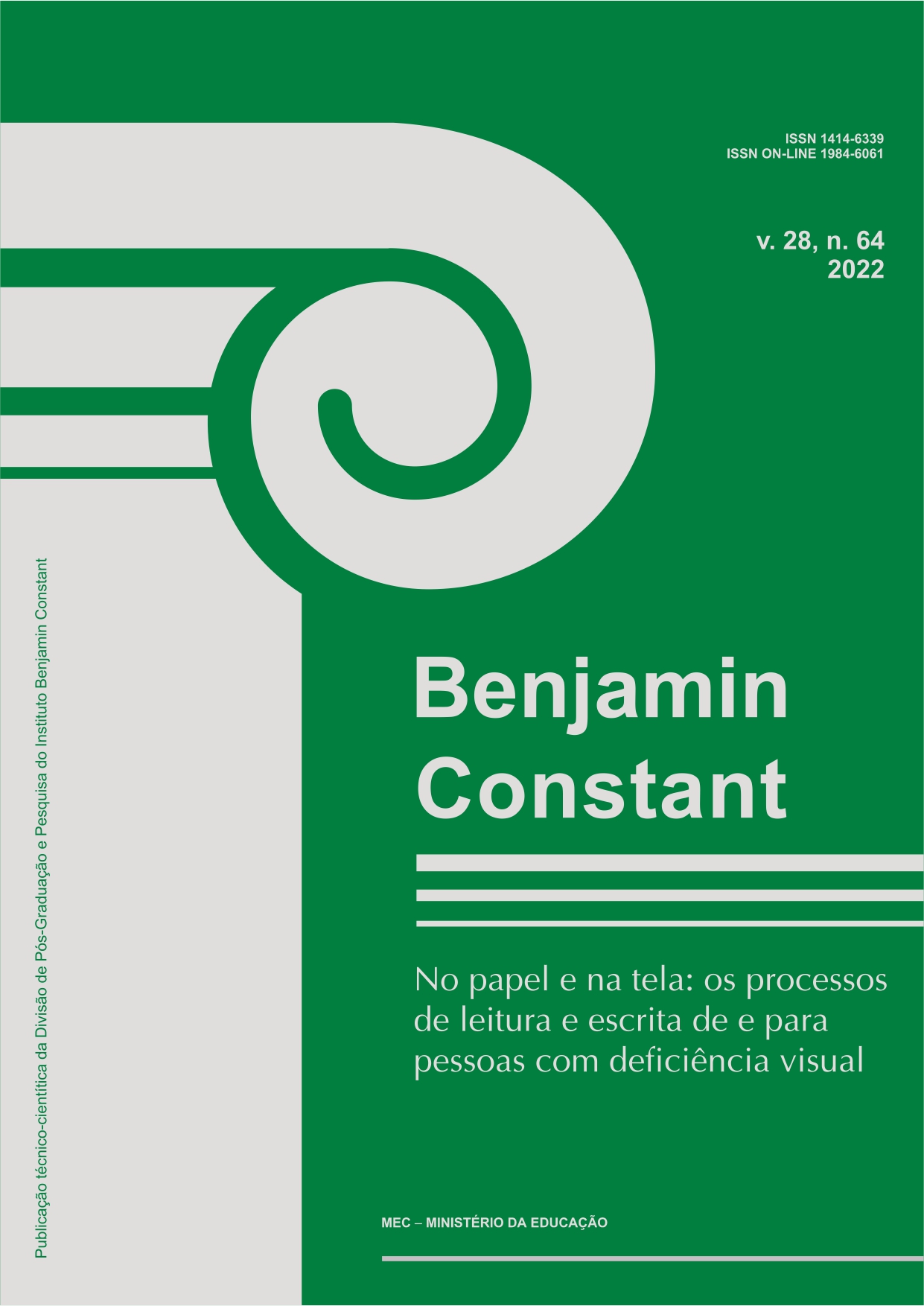Adapting public examination instruments to overcome reading limitations faced by blind participants
Abstract
This study focuses on the facilitating action of “Ledors” in administering public testing instruments to groups of individuals with different characteristics and specificities, as is the case of blind persons accessing measuring instruments through their own distinct means. It seeks to verify the fidelity (adhesion) of this action to the principle of Equity and examines the interference of the Ledor’s life experiences with the construction meaning of the text in question. The assumption is that reading a text is an act of giving meaning to it, the Ledor in this case being the person who reads to the other through oralization of the text in question. For analysis in this study, Mathematics questions were selected from the Enem exams (High School National Examination) of 2016, 2017, and 2018, as well as Level 3 questions of the OBMEP (Brazilian Mathematics Olympics for the Public Schools) exams for the same years. A data analysis methodology was used inspired by the text “Análise de Conteúdo” (Content Analysis) by Roque Moraes (1999). The “Ledor” was presented with a “Ledor” test version as a Standard test destined to “Ledors” which had images described by specialists and a discussion of limits to constructing these versions and adaptations. Using the TRI (Item Response Theory) as a beacon light in constructing distinct tests that would allow positioning of participants on the same proficiency scale, one ensures isonomy among all participants in public evaluations. In this sense, it is proposed that different tests be constructed for different groups of participants with distinct characteristics and specificities in terms of their means of access to evaluation instruments; especially in relation to groups of individuals, who are sighted and those who are blind.
References
ANDRIOLA, Wagner Bandeira. Funcionamento Diferencial dos Itens (DIF): Estudo com Analogia para Medir o Raciocínio Verbal. In: Psicologia: Reflexão Crítica, 2000, v. 13, n.3, pp. 475-483. Disponível em: https://www.scielo.br/j/prc/a/XNpWjjKwhZVcT4pRdfGQBXn/?lang=pt&format=pdf Acessado em: 09 nov. 2021.
ARAÚJO, Ubirajara Inácio. Tessitura textual: coesão e coerência como fatores de textualidade. São Paulo: Humanitas/FFLCH-USP, 2000.
BRASIL. Ministério da Educação. Parâmetros Curriculares Nacionais: terceiro e quarto ciclos de Ensino Fundamental: Língua Portuguesa/Secretaria de Educação Fundamental. Brasília: MEC/SEF, 1998.
BRASIL. Presidência da República, Secretaria-Geral, Subchefia para Assuntos Jurídicos. Decreto nº 9.508, de 24 de setembro de 2018. Brasília, 2018. Disponível em: http://www.planalto.gov.br/ccivil_03/_ato2015-2018/2018/decreto/d9508.htm Acesso em: 25 dez. 2021.
FREIRE, Paulo. A importância do ato de ler: em três artigos que se completam. São Paulo: Autores Associados; Cortez, 1983.
GUERRA, Gregório de Matos de. Poemas escolhidos. 6. ed. São Paulo: Cultrix, 1993.
HOUAISS, Antônio; VILLAR, Mauro de Sales. Dicionário da língua portuguesa. Rio de Janeiro: Objetiva, 2009.
INEP. Instituto Nacional de Estudos e Pesquisas Educacionais Anísio Teixeira. Interpretação Pedagógica da Escalas de Proficiência, Brasília: INEP, 2014. Disponível em: https://download.inep.gov.br/publicacoes/institucionais/avaliacoes_e_exames_da_educacao_basica/interpretacao_pedagogica_das_escalas_de_proficiencia.pdf Acesso em: 08 nov. 2021
INEP. Instituto Nacional de Estudos e Pesquisas Educacionais Anísio Teixeira. Procedimento de Cálculo das Notas do Enem (nota técnica). Brasília: INEP, 2011a. Disponível em: https://download.inep.gov.br/educacao_basica/enem/nota_tecnica/2011/nota_tecnica_procedimento_de_calculo_das_notas_enem_2.pdf Acesso em: 08 nov. 2021
INEP. Instituto Nacional de Estudos e Pesquisas Educacionais Anísio Teixeira. Provas e Gabaritos, Prova do ENEM 2002, prova 1 amarela. Brasília: INEP, 2002. Disponível em: http://download.inep.gov.br/educacao_basica/enem/provas/2002/2002_amarela.pdf Acesso em: 10 nov. 2021.
INEP. Instituto Nacional de Estudos e Pesquisas Educacionais Anísio Teixeira. Provas e Gabaritos, Prova do ENEM 2011, 1º dia, caderno 3 branco. Brasília: INEP, 2011b. Disponível em: https://download.inep.gov.br/educacao_basica/enem/provas/2011/05_AMARELO_GAB.pdf. Acesso em: 05 nov. 2021.
KOCH, Ingedore Grünfeld Villaça. Argumentação e linguagem. 3. ed. São Paulo: Cortez, 1993.
KOCH, Ingedore Grünfeld Villaça; ELIAS, Vanda Maria. Ler e compreender: os sentidos do texto. 2. ed. e reimp. São Paulo: Contexto, 2008.
MACHADO, Ledo Vaccaro. Ação de Ledores Diante de Questões de Matemática em Avaliações Públicas. 2020. 683f. Tese (Doutorado em Ensino e História da Matemática e da Física), Universidade Federal do Rio de Janeiro, Rio de Janeiro, 2020. Disponível em:
http://www.pg.im.ufrj.br/pemat/DSc%2010_Ledo%20Vaccaro%20Machado.pdf Acesso em: 25 dez. 2021.
MACHADO, Ledo Vaccaro. Ler: Verbo Bitransitivo: reflexões sobre adaptação de avaliações para deficientes visuais. São Paulo: Editora Dialética, 2022.
MACHADO, Nilson José. Matemática e língua materna: análise de uma impregnação mútua. 5. ed. São Paulo: Cortez, 2001.
MENDES, Enicéia Gonçalves. A radicalização do debate sobre inclusão escolar no Brasil. Revista Brasileira de Educação, Rio de Janeiro, v. 11, n. 33, p. 387-405, 2006.
MORAES, Roque. Análise de conteúdo. Revista Educação, Porto Alegre, v. 22, n. 37, p. 7-32, 1999.
OLIVEIRA, Rita de Cássia Rodrigues. Ouvir e ler o (in)visível. 2016. 134f. Tese (Doutorado em Linguística), Universidade Federal do Rio de Janeiro, Rio de Janeiro, 2016.
ORLANDI, Eni Puccinelli. As formas do silêncio: no movimento dos sentidos. 6. ed. Campinas: Editora da Unicamp, 2007.
ORLANDI, Eni Puccinelli. Efeitos do verbal sobre o não-verbal. Revista Rua, Campinas, v. 1, p. 35-47, 1995.
SACKS, Oliver. O olhar da mente. São Paulo: Cia. das Letras, 2010.
SILVA, Luciene Maria da. Qualquer maneira de ler vale a pena: sobre leituras, ledores e leitores cegos. In: Reunião Anual da ANPED, 31., 2008, São Paulo. GT-10: Alfabetização, Leitura e Escrita. Anais eletrônicos... São Paulo: PUC-SP, 2008. Disponível em: http://letrasportugues.grad.ufsc.br/files/2015/05/Qualquer-maneira-de-ler-vale-a-pena.pdf. Acesso em: 5 out. 2018.
WILL, Madeleine C. Educating children with learning problems: a share responsibility. Exceptional Children, v. 52, p. 411-415, 1986. Disponível em:
http://mn.gov/mnddc/parallels2/pdf/80s/86/86-ECP-MCW.pdf. Acesso em: 23 nov. 2018.





.png)
